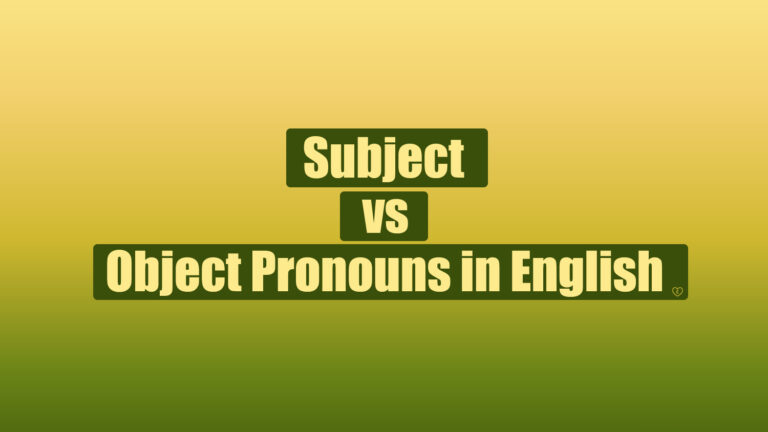When diving into the intricacies of English grammar, two terms you’ll often encounter are “subject pronoun” and “object pronoun”. These might sound complex, but their roles are fundamental in constructing meaningful sentences. Let’s delve into their definitions, differences, and examples to clarify their usage.
Definition of Subject and Object Pronouns
At its core, a pronoun is a word that takes the place of a noun in a sentence. Depending on its role, it can be classified as either a subject or an object pronoun. The subject pronoun refers to the doer of the action—the one performing the activity. On the other hand, the object pronoun pertains to the receiver of the action or the entity affected by it.
Consider the sentence, “I am eating a sandwich.” Here, “I” is the subject pronoun indicating who is doing the eating, while “a sandwich” is the object being eaten.
Differences between Subject and Object Pronouns
The primary distinction between these two types of pronouns lies in their function within a sentence. Subject pronouns typically introduce the subject or the doer of the action. In contrast, object pronouns often indicate the receiver of the action.
For instance, in “He gave him a book”, “he” is the subject pronoun denoting the giver, while “him” is the object pronoun referring to the recipient of the book.
Examples of Subject and Object Pronouns
Subject Pronouns:
- I am eating a sandwich.
- He gave her a book.
- She is running to the store.
Object Pronouns:
- I gave her a book.
- She gifted me a card.
- He is running to the store.
From the examples, it’s evident that subject pronouns generally lead the sentence, indicating the action’s performer. In contrast, object pronouns often follow, pointing to the action’s recipient.
Rules of Subject Pronouns and Object Pronouns
When employing these pronouns, it’s essential to remember a few guidelines:
- Subject pronouns introduce the sentence’s subject, while object pronouns indicate its object.
- Subject pronouns often denote the action’s performer, whereas object pronouns refer to the action’s receiver.
- In verb conjugation, subject pronouns are used in the present tense, while object pronouns are utilized in the past tense.
| Rule Description | Pronoun Type | Example |
|---|---|---|
| Introduce the sentence’s subject | Subject Pronoun | She is reading a book. |
| Indicate the sentence’s object | Object Pronoun | I gave her a book. |
| Denote the action’s performer | Subject Pronoun | They are playing soccer. |
| Refer to the action’s receiver | Object Pronoun | The teacher taught them a lesson. |
| Used in verb conjugation in the present tense | Subject Pronoun | We are studying English. |
| Used in verb conjugation in the past tense | Object Pronoun | The cat chased us around the house. |
List of Subject and Object Pronouns
Pronouns play a pivotal role in English grammar, allowing for versatility and fluidity in speech and writing. They can replace nouns, reducing redundancy and making sentences clearer. Let’s delve into the commonly used subject and object pronouns, their definitions, and examples to illustrate their usage.
Subject Pronouns
- I: Refers to the speaker or writer.
- Example: I am going to the store.
- You: Refers to the person or people being spoken or written to.
- Example: You are my best friend.
- He: Refers to a male person or male animal.
- Example: He is my brother.
- She: Refers to a female person or female animal.
- Example: She is an engineer.
- It: Refers to a thing, idea, or animal that is not human.
- Example: It is raining outside.
- We: Refers to the speaker or writer and one or more other people.
- Example: We are going on a trip.
- They: Refers to two or more people, things, or animals.
- Example: They are my friends.
Object Pronouns
- Me: Refers to the speaker or writer when they are the object of the verb or preposition.
- Example: She gave me a gift.
- You: Refers to the person or people being spoken or written to when they are the object.
- Example: I told you the secret.
- Him: Refers to a male person or male animal when they are the object.
- Example: I saw him at the park.
- Her: Refers to a female person or female animal when they are the object.
- Example: The letter is for her.
- It: Refers to a thing, idea, or animal that is not human when it is the object.
- Example: I can’t find it.
- Us: Refers to the speaker or writer and one or more other people when they are the object.
- Example: The teacher praised us.
- Them: Refers to two or more people, things, or animals when they are the object.
- Example: I invited them to the party.
Summary
Grasping the distinction between subject and object pronouns is crucial in mastering English grammar. By understanding their roles and where they fit in sentences, you’ll find constructing grammatically correct and meaningful statements much more intuitive.
For those keen on deepening their knowledge on pronouns and their significance in English, there are numerous references available to explore further.
FAQ about Subject vs Object Pronouns in English
Why are pronouns important in English grammar?
Pronouns help in making sentences concise and avoid repetitive use of nouns. They make conversations sound more natural and fluid.
Can a subject pronoun ever be used as an object pronoun?
No, subject and object pronouns have distinct roles. Subject pronouns represent the doer of an action, while object pronouns represent the receiver of an action. For instance, he is a subject pronoun, and him is its corresponding object pronoun.
How can I easily identify whether a pronoun is a subject or object in a sentence?
A simple trick is to identify the action and its doer in the sentence. The pronoun representing the doer is the subject pronoun, while the one representing the receiver or the one affected by the action is the object pronoun.
Are there any pronouns that can serve both as subject and object?
Yes, the pronoun you can be both a subject and object pronoun. For example, You wrote the letter (subject) and I told you (object).




